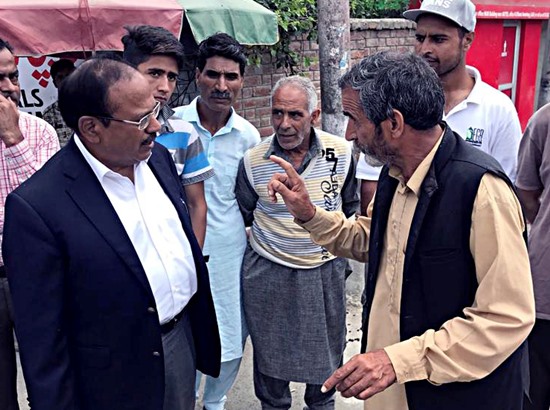A short, dark-skinned, unassuming individual, who will never stand out in a crowd – a quality which comes in very handy if you are a spy, which he was – is working tirelessly on the ground in the Kashmir Valley, keeping a close watch on the situation.
Ajit Doval, probably considered to be the sharpest mind in the country when it comes to strategic affairs -- is no ordinary National Security Advisor. Instead of running affairs from the cosy confines of an office, his hands-on approach is what makes him different from most of his predecessors.
Since the abrogation of Article 370 in Jammu and Kashmir and bifurcation of the state on August 5, Doval is in Srinagar with his ear to the ground, assessing the situation minutely.
His daily inputs from the Kashmir Valley are vital for framing day-to-day strategy for the region.

Ajit Doval interacting with Kashmiris
Doval (74) has always been in thick of action. He joined the police in the late 60s as an IPS officer and in 1972 he was posted to Intelligence Bureau (IB), where he served for more than three decades with distinction.
His stint in IB gave him an unparalleled understanding of the subcontinent which came in handy when Narendra Modi, after taking on the reins as Prime Minister in 2014, made Doval National Security Advisor.
Doval is credited with ushering in new tactics of dealing with asymmetric warfare waged by Pakistan against India.
Doval favours an aggressive approach and taking the fight to the enemy. This was evident when in response to the Uri attack by Pakistan-based militants in September 18, 2016 which killed 19 Indian Army soldiers, Indian Army special forces crossed the Line of Control and killed a large number of militants.
In February this year after the Pulwama attack which killed 44 CRPF men, Indian Air Force fighter aircraft attacked a terrorist training camp in Balakot inside Pakistan which resulted in deaths of around 200 militants.
Doval has always been considered to be a daredevil. During his tenure in the IB he was always at the frontline of the battle against terrorism and insurgency.
He successfully infiltrated the inner circles of militants in different parts of the country and plotted their downfall.
Doval even spent 7 years in Pakistan in disguise collecting information on the Pakistan Army and anti-India militants based there.
During Operation Black Thunder II in May, 1988, Dovel disguised as a vegetable seller entered the Golden Temple complex which was occupied by Sikh militants to assess their strength, which was thought to be around 40.
However, when Doval came out he informed Punjab DGP KPS Gill, who was incharge of the operation, that there were 200 militants inside.
Instead of storming the complex like in 1984 which resulted in enormous casualties, this time the decision was taken to cut off electricity and water supply. Nine days later the militants surrendered and the operation ended successfully.
In Kashmir, Doval, who now has a cabinet-rank, a first among NSAs, is proving to be the eyes and ears for Modi in this sensitive phase when the state of Jammu and Kashmir is going through an unprecedented transformation. Will his, supposed, sharp reading of the situation prove priceless in readying a roadmap for the region? Only time will tell.
August 15, 2019